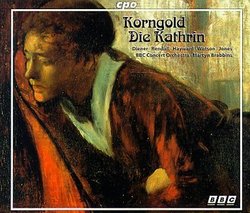| All Artists: Erich Wolfgang Korngold, BBC Concert Orchestra, Mary Brabbins, Melanie Diener, David Rendall, Robert Hayward, Lillian Watson, Della Jones, BBC Singers Title: Korngold: Die Kathrin / Diener, Rendall, Hayward, Watson, D. Jones Members Wishing: 0 Total Copies: 0 Label: Cpo Records Release Date: 10/27/1998 Album Type: Box set Genre: Classical Styles: Opera & Classical Vocal, Historical Periods, Modern, 20th, & 21st Century, Symphonies Number of Discs: 3 SwapaCD Credits: 3 UPC: 761203960224 |
Search - Erich Wolfgang Korngold, BBC Concert Orchestra, Mary Brabbins :: Korngold: Die Kathrin / Diener, Rendall, Hayward, Watson, D. Jones
 | Erich Wolfgang Korngold, BBC Concert Orchestra, Mary Brabbins Korngold: Die Kathrin / Diener, Rendall, Hayward, Watson, D. Jones Genre: Classical
|
Larger Image |
CD Details |
CD ReviewsGuileless Melody Eric D. Anderson | South Bend, IN United States | 06/16/2002 (5 out of 5 stars) "That this work of splendor has languished in obscurity speaks volumes about the problems of opera in the modern age. While Strauss was thinning his orchestral textures and trying to be like Mozart, after Schreker and others had largely abandoned expressionism in favor of "zeitoper", Korngold, true to his inner voice, headed in the opposite direction and produced a work with more splendid melody than any work since Puccini, and in spirit "Die Kathrin" is Puccinian in so many ways. Who else since Puccini (or before him for that matter) has so perfectly captured the chemistry of infatuation when young lovers meet? The accompanying booklet apologizes for the libretto, and it's true that it lacks the tight dramatic structure and sharp characterizations of Puccini's oeuvre, but I thought it worked. Puccini was a very sophisticated dramatist, and the elements of his operas are, almost without exception, balanced to perfection. But with "Kathrin", there's not an ounce of guile or calculation. And while Puccini's stories head for heartache, "Kathrin" is an archtypal story of love, at first torn apart by the difficulties of the world, which survives through the power of steadfast devotion and optimism.Calling this work "operetta like" sells it short. It does have one brief scene of spoken dialogue (included in the booklet, but not in the recording), but the music is through-composed in a ripe late romantic idiom, tinged with the harmonic language of expressionism, but immediate it's appeal. The highlights are too numerous to catalogue, but Kathrin's prayer at the end of Act I "Mein Mann hat mich vermieden" ("My man has left me") is heartbreaking, with the music alone enought to bring tears to your eyes. And the opening to Act III is equally moving, with chiming church bells, and a melody that only Korngold could have written.This was Korngold's last opera[...]. Korngold was planning a new opera at the time of his premature death in 1957. Imagine if he'd lived to finish it--a true romantic opera appearing in the mid 1960s! As much as I love Barber's "Antony and Cleopatra" (and, yes, I do like it very much), I'd guess Korngold's work would have blown it away. So, in my opinion, it's a sin to neglect what he did leave us. Please, opera companies...stage "Die Kathrin". Let it assume it's proper place in the reperatory." A Rolls-Royce Bon Bon Michael Gast | New York, NY United States | 12/27/2002 (5 out of 5 stars) "This is Korngold at his most appealingly melodic. No bombast, no convoluted German Expressionistic libretto, no metaphysical plot. Just a Puccini-esque love story with an extraordinary cast of brilliant, committed singers. "Rondine" with a Swiss twist. The piece is delightful from beginning to end with moments of the highest inspiration. Korngold, as always, is a genius at everything he touches. Be prepared to fall in love!" Don's views Don Hutton | Etobicoke, Ontario Canada | 08/21/2004 (5 out of 5 stars) "This recording was a complete surprise to me. I've long loved the operatic music of Korngold but had not known of this recording before. What an absolute delight! It should be on every "modern" opera lovers record shelf. Thank you CPO and BBC for bringing this music to us. And thank you Amazon for making it available. Nowhere, either in-store or on the net could I find this beautiful music."
|

 Track Listings (10) - Disc #1
Track Listings (10) - Disc #1